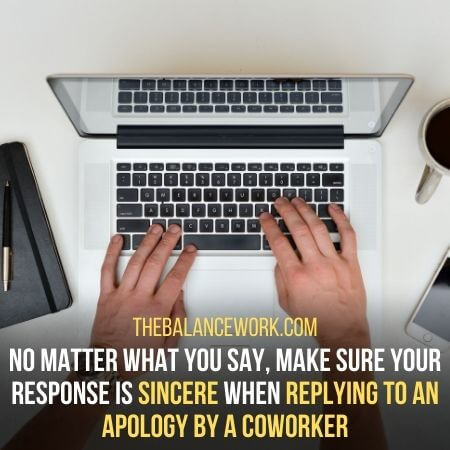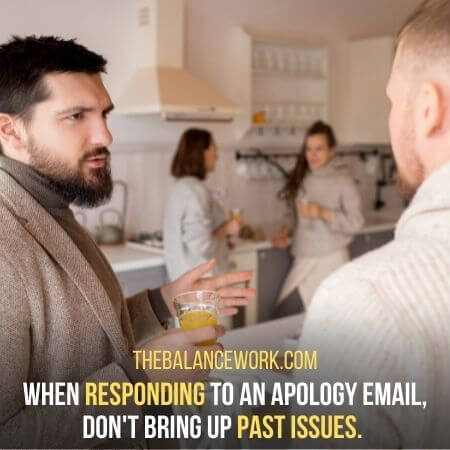Even if someone apologized to the wrong person, it’s still nice to say thanks.
How To Respond To An Apology Email From A Coworker? Responding with a simple “thanks” helps keep things friendly at work.
Key Takeaways:
- Even if someone apologized to the wrong person, it’s still nice to say thanks.
- Responding with a simple “thanks” helps keep things friendly at work.
- When someone apologizes, it’s important to acknowledge what happened and express how it made you feel.
- Offering a solution and moving on from the issue can help improve relationships and productivity.
- It’s important to choose the appropriate medium for your response, whether it’s email, phone call, in-person, or text.
- Avoid being sarcastic, bringing up past issues, ignoring the apology, attacking the person, or threatening them in your response.
- Forgiveness and moving forward are key to maintaining a positive work environment.
8 Things To Remember When Responding To An Apology Email From A Coworker
If you made a mistake and upset someone at work, say sorry.
If you did nothing wrong, you can still be nice and try to forget about the problem.
Here are some easy ways to answer an email apology at work:
1. Thank Them For Apologizing:
Saying “thank you” shows you’re ready to forget what happened and be friends again. Here are some ways to say thank you:

– “Thanks for saying sorry.”
– “I appreciate you apologizing.”
– “I forgive you, thanks for reaching out.”
Remember to be genuine when you say these things. If you don’t mean them, your coworker will know and things might get worse.
Saying “sorry” can be a great way to show you care, even if you weren’t at fault. It shows you understand something bad happened and you want to fix things.
Here are some examples of what you can say:
“I’m sorry things turned out this way. I know it wasn’t your fault.”
“I’m sorry we argued. I didn’t mean to upset you.”
“I’m sorry for what I said. It wasn’t right of me.”
This helps calm things down and makes it easier to move forward. It’s a good way to respond to a work email where someone apologizes, even if they didn’t do anything wrong.
2. Acknowledge What Happened:
If someone did something that bothered you, it’s good to talk about it with them calmly before letting it go.
This way, they know you’re not ignoring it but are willing to talk.
You can start by saying something like:
“I know you didn’t mean to, but what you said hurt my feelings.”
“I understand you’re stressed, but that doesn’t make it okay what you said.”
“Even though it was an accident, I’m still upset about it.”
This also allows you to talk about how the issue made you feel.
“I didn’t like the way you spoke to me.”
“Your words made me feel small.”
“What you did made me sad.”
Talking about it can help you move on. It also helps your coworker understand how their actions affected you.
3. Offer A Solution:
If you can fix what you did wrong, offer to do it. This shows you want to work together to make things better.
“I’m sorry I upset you. I’ll try harder to be careful next time.”
“I’m sorry for what I said. Can we just leave it behind and be friends again?”
“I’m sorry for what I did. Is there anything I can do to fix things?”

This also shows you take responsibility for your actions and want to improve.
Remember, only offer to do things you can do. Otherwise, it might make things worse.
4. Move On:
If you don’t want to keep thinking about the problem, you can just let it go and continue being friends. This shows you’re ready to be friends again.
Here are some things you can say:
“I’m sorry that happened, but let’s not worry about it anymore.”
“Thanks for saying sorry. I forgive you, and we can be friends again.”
“I appreciate you apologizing. Let’s forget about this and move on.”
This is a good choice for small problems, or if you don’t want to talk about them anymore.
It’s also a good option if you’ve already talked about the issues and both agree to move on.
5. Ignore It:
If the problem is small, you can just let it go. This shows you’re not making a fuss. You can say things like:
“No worries, everyone makes mistakes.”
“I know you didn’t mean it, so let’s move on.”
“It’s alright, I know you didn’t hurt me on purpose.”
But remember, only do this for small problems.
For big problems, you need to talk about them. If you don’t, they’ll only get worse and cause more trouble later.
6. Accept The Apology:
If your coworker says sorry, it doesn’t mean anything unless you accept it. Accepting their apology means you forgive them and can forget about what happened.
Here are some ways to say you accept their apology:
“Thanks for saying sorry. I appreciate it.”
“I forgive you. Let’s move on from this.”
“Thank you for apologizing. It means a lot.”

This is the best thing to do when someone apologizes. It shows you’re willing to be friends again and forget what happened.
It will also help to improve your relationship with your coworker.
7. Greet Them When You Meet Them Afterwards:
If you already talked things out with your coworker, you can say hello to them like usual when you see them again. This shows you’re not mad at them anymore.
Here are some examples of what you can say:
“Good morning! How are you doing today?”
“Hi! How was your weekend?”
“Hey! I’m glad we were able to talk about what happened. I’m ready to put it behind us.”
Being friendly will make working together easier in the future and help you get along better with your coworker.
8. Replying Mediums:
When you see an email, you can reply in many ways, like email, phone call, or text. But remember, take a beat to think before you answer.
1. Via Email:
If someone apologizes shortly and clearly, you can:
– Reply to their message and thank them for saying sorry.
– If there’s a way to fix things, you can suggest an idea. But keep it short and simple.
2. In Person:
This is a good choice for a big problem or if you want to talk a lot about it.

But make sure both of you are ready to talk before meeting in person. Otherwise, it might make things harder.
3. On The Phone:
Talking on the phone is a good choice when you can’t meet face to face, but important things are usually best discussed in person.
If you do call someone, make sure they are free to talk and can listen to you carefully.
4. Via Text:
This way isn’t great, but it’s better than nothing.
Talking through text isn’t ideal for important things. But if you have to, keep it short and clear.
You can use smileys to show how you feel but don’t overdo it, or it might look unprofessional.
Here are some tips for replying to a coworker’s apology email:
Stay calm and polite.
Most importantly, forgive them and move on.
Do Not Accept An Apology If
Don’t say sorry unless you really mean it. Some people might just say sorry to avoid trouble, like
“Sorry I punched you, can we still play?”
“Sorry I broke your toy, can I have it back?”
These aren’t true apologies because they don’t admit they did something wrong. They just want things to go back to normal.
If someone apologizes but you don’t think they mean it, you can tell them. You can say things like:
“I don’t think you’re really sorry.”
“Thanks for saying sorry, but that’s not enough.”
“I appreciate the apology, but I need more time before I can forgive you.”
This shows that you’re not going to accept any apology. The person will need to work harder to earn your forgiveness.
1. Set A Consequence:
If something bothers you and you don’t want to just forget about it, you can take action to show it’s not okay. This could mean:

Telling someone in charge (like HR) if it’s a serious problem.
Asking someone to fix a mistake they keep making, like cleaning up a mess.
Asking someone to leave if they’re causing trouble.
Do this only for important things, or if someone keeps repeating something they already said sorry for.
2. Talk To Them In Person:
It’s best to talk to your coworker face-to-face about the problem. This helps fix things faster. You could say something like:
“Hey, can we chat about what happened?”
“I appreciate you saying sorry, but I’d feel better talking about it in person.”
“Even though it was an accident, I’d still like to talk to you about it.”
Talking on the phone or via video call is okay too, but face-to-face is always best.
What To Avoid When Responding To An Apology Email From A Coworker
You should avoid a few things when responding to an apology email from a coworker.
1. Don’t Be Sarcastic:
Be careful with jokes around your coworker, they might not understand them. Making a joke after something bad happened could make things worse.
If someone apologizes to you in an email, be nice and honest in your reply. If you’re not ready to be nice, it’s okay to not reply at all.
They said sorry, so be respectful.
It takes guts to admit you’re wrong, so appreciate them apologizing. You can also let them know you’re not mad anymore.
2. Don’t Bring Up Past Issues:
When someone apologizes in an email, don’t talk about other things they did wrong before. This will only make things worse.

If they did something bad in the past, try to move on. Forgive them and forget about it.
Otherwise, you’re just going to start a fight. And that’s not going to do either of you any good.
3. Don’t Ignore Them:
Ignoring someone is rude. It shows that you’re not willing to forgive them.
If you want to reply to their “sorry” message, do it soon. If not, it’s better to not say anything.
Even if you don’t reply, they’ll know you got their message. They’ll also know you’re not ready to forgive them yet.
4. Don’t Attack Them:
Be nice when replying to an apology email, don’t yell or be mean. This will only make things worse.
If you’re upset, it’s okay to stay quiet. Don’t say anything that might make the other person feel even worse.
The other person is already feeling bad about what they did. There’s no need to make them feel worse.
5. Don’t Threaten Them:
Threatening someone is never a good idea. And it’s not going to help the situation.
Don’t threaten someone, even if you’re feeling angry. It won’t make things better and you might get in trouble.
It’s better to just avoid threats altogether.
Conclusion:
When your coworker emails to say sorry, first say “thanks.”
Then, you can decide to forgive them or let them know there’s a consequence.
Talk to them face-to-face to work things out. Remember to be nice, not mean or sarcastic, and don’t bring up old stuff.
Last Updated on 18 hours by Usama Ali
- Why Does My Boss Wink At Me? 6 Potential Reasons - October 5, 2023
- Is It Legal For Your Employer To Call Your Doctor? No, But… - October 4, 2023
- 12 Ways To Deal With A Low IQ Person - September 22, 2023